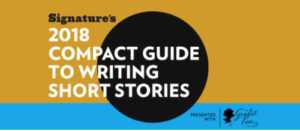Yesterday’s awesome prompt was written by one of the authors who contributed to the Signature’s 2018 Compact Guide To Writing Short Stories. I can’t recommend it enough.

For Day 2, here’s a sneak peak of what you’d be seeing all month if you were a StoryADay Superstar. Join us!
(For the rest of the month, the prompts here will be text-only and not as detailed)
Superstars get videos like this, a private forum, guided meditations and a weekly video hangout. Join us?
The Prompt
Use this story formula to to create an interesting character, give them a desire, kick off some intriguing action and plan the kind of resolution you want.
Once you have that skeleton, you can start filling in colorful details…and soon your creative brain will be demanding you start to write!
A _______ (adjective) ________(noun), who _________(verb) ___________(subject), then _________(related verb) __________(resolution)
TIPS
Continue reading “Day 2 – Quick Story Formula”

